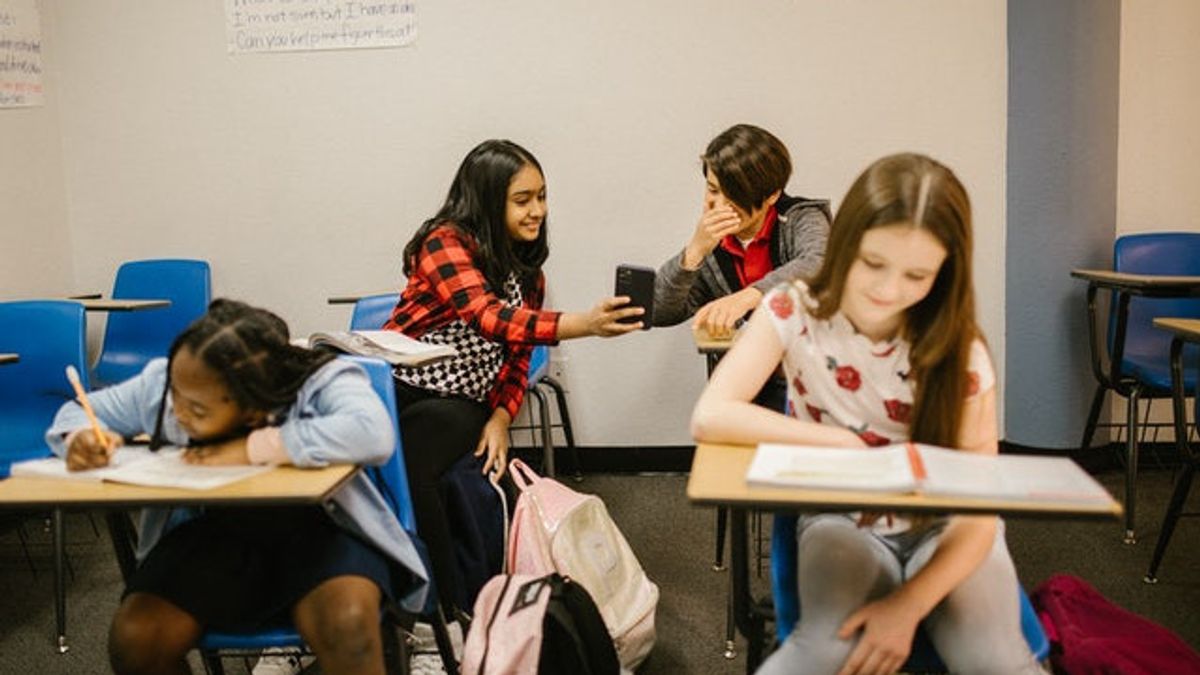JAKARTA - The pandemic has changed student habits. Two years of distance learning made it impossible for students to be prevented from using cell phones.
Based on the Indonesian Internet Survey Report compiled by the Association of Indonesian Internet Service Providers (APJII) per 2021-2022 (Q1), the internet penetration rate for children aged 5-12 years reached 62.43 percent, while for children aged 13-18 the internet penetration was 99. 16%. A total of 90.61% of children aged 13-18 years access the internet through their gadgets.
For students, the internet is very supportive of learning activities, especially during the pandemic. Various benefits ranging from means of communication to get information. However, the other side of the use of the internet for school-age children is the phenomenon of cyberbullying which is increasingly widespread.
According to the results of the Center For Digital Society (CfDS) research as of August 2021 entitled Teenager-Related Cyberbullying Case In Indonesia, which was conducted on 3077 junior high and high school students aged 13-18 from 34 provinces in Indonesia. The results of the research related to cyberbullying stated that 1895 students (45.35%) claimed to have been victims, while 1182 students (38.41%) were perpetrators.

Cyberbullying is a social media platform that is commonly used by WhatsApp, Instagram and Facebook. The cyberbullying behavior that is most often carried out is cyber violence (harassment), defamation (denigration) and exclusion.
In terms of impact, according to UNICEF, cyberbullying will affect three aspects, namely mental, emotional and physical. Mentally, students who experience cyberbullying will feel annoyed, embarrassed, stupid and even angry. From the emotional aspect, victims of cyberbullying will lose interest in the things they like.
For the physical aspect, the most impacted by cyberbullying victims are fatigue (lack of sleep), stomach pain and headaches. In extreme cases, cyberbullying can even trigger a person to become depressed and commit suicide.
How to prevent? KGSB (Community of Teachers Satkaara Berbagi) held a Webinar on Preventing Cyberbullying on Students, Saturday, July 23, 2022, which was attended by educators from KGSB members. This theme is in line with the theme for organizing National Children's Day, July 23, 2022, namely "Protected Children, Advanced Indonesia."
Hundreds of teachers and lecturers from PAUD to Universities in Indonesia and Timor Leste listened to the presentation of the Secretary General of the Indonesian Internet Service Providers Association (APJII), Zulfadly Syam, Deputy Head of Community Service and Plt. Head of Criminal Law Studies at Jentera Indonesian Law College and Former Director of the Indonesian Legal Aid Foundation for the period 2017-2021, Asfinawati and Founder of the BK Teacher's House and Widyaiswara Center for Motivating Teachers for West Java Province, Ministry of Education and Culture, Research and Technology RI, Ana Susanti, M.Pd. CEP, CHt.

KGSB founder, Ruth Andriani said cyberbullying is another side of the internet that crosses boundaries. Therefore, this phenomenon needs to be addressed by all parties properly, especially teachers and educators as a student support system.
“The webinar discusses from a legal perspective and how to behave wisely on the internet as a preventive effort from cyberbullying to students. Hopefully, through this debriefing, teachers can better understand and provide the right response to acts of cyberbullying in the school environment. Together, let's play an active role in breaking the chain of bullying and create a school environment that is free from bullying in any form," said Ruth.
Founder of Rumah Guru BK, Ana Susanti, said that along with the times, cyberbullying is a development of traditional bullying.
“The difference is that cyberbullying occurs anywhere, especially online and anytime, the perpetrators are anonymous and more difficult to identify. Yet all children exposed to cyberbullying can suffer. Be it the victim, the perpetrator and the person who witnessed it," said Ana.
Furthermore, the Secretary General of the Association of Indonesian Internet Service Providers, Zulfadly Syam, in his presentation stated that there were six things that caused the rise of cyberbullying, namely offline morals, blind personal data protection, internet only for entertainment, low community development, law enforcement and exploitation of symbols.
For this reason, he focuses on socializing internet ethics and social media wisely. The need for schools to increase literacy about cyberbullying and direct children to use the internet for productive and positive things because we cannot stop the rapid and massive development of technology.
"WISE; B is to use good language. I represents emotion Icon depiction, J is Don't share before filtering. A is realized by managing personal data and K is strengthening the password so that it is not easily hacked by others," said Zulfadly.
While the Deputy Head of Community Service as well as Plt. Head of the Criminal Law Study Division at Jentera Indonesian Law College, Asfinawati explained about legal regulations, several laws related to cyberbullying, namely the ITE Law Article 27 (1), Article 27 (3), Article 29, Article 28 (2) and Article 14 of the Law. TPKS.
Caution is needed and further review in the use of these regulations. However, he emphasized that the legal sanctions applied to cyberbullying perpetrators were the last solution of various settlement efforts.
The prevention efforts that can be done in the school environment are by spreading awareness to students regarding cyberbullying, not victimizing and making cyberbullying and its impact a relevant subject matter at school.
“Basically, a child is a child. As educators we need to be more open to what we don't know (the internet). Give an example of respecting fellow human beings closely and being a friend to students. In many cases of cyberbullying, what saves students is not law or discipline, but the response from the closest environment, including teachers," he said.
The English, Chinese, Japanese, Arabic, and French versions are automatically generated by the AI. So there may still be inaccuracies in translating, please always see Indonesian as our main language. (system supported by DigitalSiber.id)












